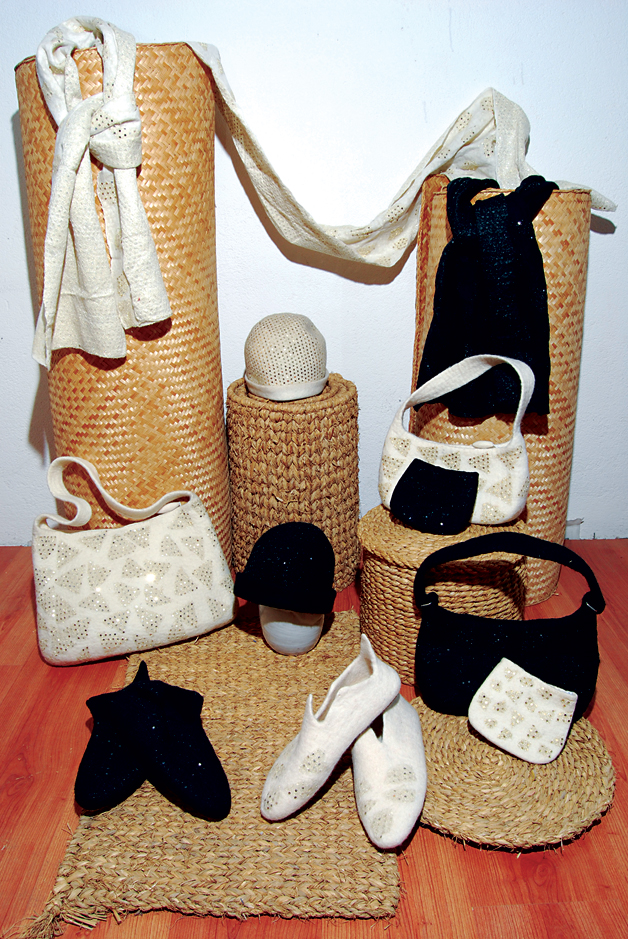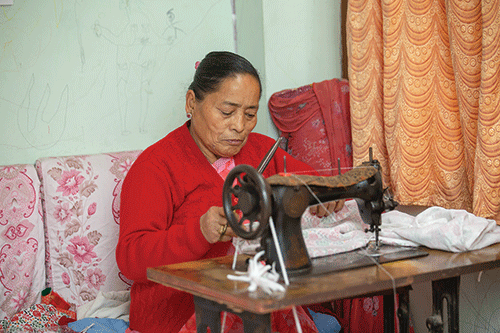Bright colored and amusing shoes, rubber bands, balls,toys, hats, bags and decora
tive items made of felt certainly ignited the child in me. Research on felt products, knitwear and its making processes landed us at the Nepal’s Association of Craft Producers (ACP). Unable to resist temptation, I put on a bright Afghan looking topi, gawked at baby slippers and wished I was a child so that I could decorate myself colorfully with these felt products. Knitwear, too
 Original designs on sweaters, ponchos, knitted stuffed cats, dogs and other animals bundled up with adorable knitwears looked like they belonged in the North Pole at Santa’s workplace. The designs, colors and the FINE work done on them were spectacular. And to think these are all made by the hands of low income women with a little skill, but with training provided by ACP. Wool and woolen products never seemed so exciting.
Original designs on sweaters, ponchos, knitted stuffed cats, dogs and other animals bundled up with adorable knitwears looked like they belonged in the North Pole at Santa’s workplace. The designs, colors and the FINE work done on them were spectacular. And to think these are all made by the hands of low income women with a little skill, but with training provided by ACP. Wool and woolen products never seemed so exciting.
The Association of Craft Producers (ACP)
Nepal’s premier craft association, ACP is a local not for profit fair trade organization registered in 1984. At ACP, the skills of trainees, 90% of whom are women and 10% men, of all castes are honed to preserve traditional skills and designs. ACP’s primary focus is to provide full range of services to low income women lacking mobility. ACP not only trains women with low skills and nderprivileged backgrounds, but also provides them the facility of completing their tasks at home. Along with their income, they are provided several benefits like performance rewards, counseling services, education for their children and medical allowance, to name a few.
“We discourage migration”, Meera Bhattarai, Founder Member and Executive Director of ACP tells us. “We encourage producers from outside the valley–Dhaka products come from Terathum, copper from Palpa, baskets from Baglung, and from many other places. Beginning with 38 producers in 1984, the services of ACP now reach 1200 beneficiaries whose incomes have increased dramatically. ACP, a member of Fair Trade Group Nepal (FTG), is strictly against child labor. It also collects rainwater, manages a waste water system, uses recycled paper, and discourages plastic bags. Paper wastes are burnt, biodegradable products are decomposed to be used as fertilizers, and plastics are separated and sold for recycling and, above all, the organization maintains a smoke free environment.
Spread over 43,000 square feet, the buildings and floors at ACP are separated into discrete areas by the varieties of work. ACP makes products and offers services in weaving, felting, carpentry, leather, sewing, painting, ceramics, paper crafts, knitting, quilting, block printing, screen printing, wool spinning, embroidery and metal work. “Diversification is essential and has ensured our success, as we nurture traditional skills and revive them to fit the modern market place,” Meera Bhattarai says. Floor by floor, room by room, ACP was filled with women clad in apron, masks and gloves; but we were struck by the variety of craft products from beautiful and creative ceramics, baskets drying in the sun, wooden products, wool, felt and much more.
Vibrant Felts
Many stories have been told about how felt making was discovered. One of these dates back to the story of Noah’s Ark. Researchers believe that felt is one of the earliest textile forms. In Nepal, felt techniques were traditionally used to make floor mats and blankets known as ‘radi’ and ‘pakhi’. Felt is a non-woven fabric formed when wool fibers lock together due to the application of heat, moisture and pressure/agitation.
ACP is the pioneer organization to revive felt with diversification into contemporary designs. At ACP, there is a felt unit with 30 women producers. ACP is also working with six groups consisting 125 felters. Felt making starts with dyeing the wool. The dyed wool is then fed into carding machine, which cleans and opens up the dyed wool, creating fuzzy and extremely soft wool. Felts come in bright blue, green, pink, magenta, yellow, and other colors. The carded wool is weighed and given to producers according to their needs. Producers are also given design graphs and methods that the creative team of ACP makes according to clients’ own specifications. Producers are free to seek guidance when needed.
The wool is made into sheets, ropes, balls, shoes, caps, bags, scarves, flowers and various other shapes, by continuously rubbing and pressing it around the mold with lukewarm water and soap. This process is done completely by hand. Products can be plain or colorful, or have shiny sequins pasted on them. Felt products are exported mainly to Europe, the USA, New Zealand and Australia, and is sold in the local market through the Dhukuti store, their outlet in Kupundol.
Knitwear’s and Knitted Products
Women sitting in the winter sun with needles and wool in their hands used to be a familiar sight. Mufflers, sweaters, topis and socks are still made for family member, made with love and gratitude, investing a lot of time, effort and concentration in their making. ACP saw the potential in the needles of Nepali women who could be easily trained into a competent and reliable workforce. In 1986, ACP organized a small group consisting of dozen knitters coming from an underprivileged community. Today, ACP provides employment to over 200 knitters.
The women come to the ACP service center with basic knitting skills. They go through an orientation period of 20 to 22 days, after which ACP provides them with raw materials and design specifications, with which they work at home. Working at home gives them the time to take care of household while earning a living. The knitters are given fixed time periods to complete their products. After the knitted wears and products are handed in, they are checked for quality and if the standard is unmet the knitters are requested to undo the knitwear and make the correction.
Knitwears and felts are only two of the many skills that ACP promotes. The great value of this organization is providing regular design, marketing and technical services to low income individual, primarily, female craft producers resulting in regular adequate wages to supplement family income and improve the overall standard of living. Traditional crafts of Nepal are preserved by the hands of Nepali women working in their homes. Nothing could be more fulfilling! g AS
Association for Craft Producers, Ravi Bhawan Mode, Kathmandu, Phone 427.5108 or 427.0721, fax 427.2676, or email: craftacp@mos.com.np, and on the web at www.acp.org.np










